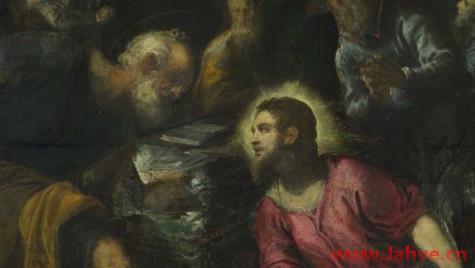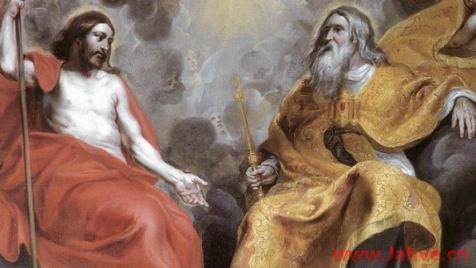 Bishop Barron翻译|Carrie2018-4-27
Bishop Barron翻译|Carrie2018-4-27 朋友们,今天的福音既熟悉又庄严,耶稣劝告我们要信任祂:“你们心里不要烦乱;你们要信赖天主,也要信赖我。”“信任”这个简单的词却包含着至关重要的灵修意义。先知耶肋米亚用最质朴无华和简洁的方式把这种信任表达出来:“凡信赖世人,以血肉的人为自己的臂膊,决心远离上主的人,是可咒骂的!” 反之:“凡信赖上主,以上主作依靠的人,是可祝福的。”对天主全心信任、心怀希望、专心致志是什么意思?意思是把整个人生扎根于天主,而不是把关注点放在世俗事物之上:即财富、权力、享乐和荣誉。问一问自己:“我的人生重心何在?”《圣经》从不间断地提出这个问题。例如:在《若苏厄书》中,若苏厄直截了当地问以色列人:“你们事奉上主还是其他的神?”你们今天面对的正是这个问题。Friends, in today’s familiar and majestic passage, Jesus exhorts us to trust him: “Do not let your hearts be troubled. You have faith in God; have faith also in me.”So much depends on the spiritual meaning of the little word “trust.” Jeremiah the prophet laid it out as starkly and simply as possible: “Cursed be the one who trusts in human beings, who seeks his strength in flesh, whose heart turns away from the Lord.” And conversely, “Blessed is the one who trusts in the Lord, whose hope is in the Lord.”What does it mean to trust, to have hope, to turn one’s heart to God? It means to root the whole of one’s life in God, and not to ground our concerns in the things of this world: wealth, power, pleasure, and honor.Ask yourself: “What is the center of gravity in my life?” The Bible consistently proposes this question. For example, read the book of Joshua, when Joshua lays it on the line for the people of Israel: “Do you serve the Lord or some other gods?” That’s the question being asked of you today.2018-4-28
朋友们,今天的福音既熟悉又庄严,耶稣劝告我们要信任祂:“你们心里不要烦乱;你们要信赖天主,也要信赖我。”“信任”这个简单的词却包含着至关重要的灵修意义。先知耶肋米亚用最质朴无华和简洁的方式把这种信任表达出来:“凡信赖世人,以血肉的人为自己的臂膊,决心远离上主的人,是可咒骂的!” 反之:“凡信赖上主,以上主作依靠的人,是可祝福的。”对天主全心信任、心怀希望、专心致志是什么意思?意思是把整个人生扎根于天主,而不是把关注点放在世俗事物之上:即财富、权力、享乐和荣誉。问一问自己:“我的人生重心何在?”《圣经》从不间断地提出这个问题。例如:在《若苏厄书》中,若苏厄直截了当地问以色列人:“你们事奉上主还是其他的神?”你们今天面对的正是这个问题。Friends, in today’s familiar and majestic passage, Jesus exhorts us to trust him: “Do not let your hearts be troubled. You have faith in God; have faith also in me.”So much depends on the spiritual meaning of the little word “trust.” Jeremiah the prophet laid it out as starkly and simply as possible: “Cursed be the one who trusts in human beings, who seeks his strength in flesh, whose heart turns away from the Lord.” And conversely, “Blessed is the one who trusts in the Lord, whose hope is in the Lord.”What does it mean to trust, to have hope, to turn one’s heart to God? It means to root the whole of one’s life in God, and not to ground our concerns in the things of this world: wealth, power, pleasure, and honor.Ask yourself: “What is the center of gravity in my life?” The Bible consistently proposes this question. For example, read the book of Joshua, when Joshua lays it on the line for the people of Israel: “Do you serve the Lord or some other gods?” That’s the question being asked of you today.2018-4-28 朋友们,在今天的福音中,耶稣宣布祂与天主的相互内存:“你不信我在父内,父在我内吗?”C·S·路易斯和J.R.R·托尔金的共同朋友查尔斯·威廉斯说过,基督教最重要的理念是“相互内存”,他称之为相互内在。但有时我们忘了所有人都是互相联系的。我们通常是怎样识别自己的?几乎都是通过与他人的关系:我们是儿子、兄弟、女儿、母亲、父亲、组织成员或教会成员。但读一下今天的福音,看看耶稣是怎样识别自己的。耶稣透露天主存在的相互内存性。斐理伯对他说:「主!把父显示给我们,我们就心满意足了。」耶稣回答说:「斐理伯!这么长久的时候,我和你们在一起,而你还不认识我吗?谁看见了我,就是看见了父。”除非圣父和圣子互相内含对方,否则耶稣的话怎么可能是真的?虽然圣父和圣子确实有区别,但是两者因为相爱而完全紧密相连。正如耶稣所说的,“是住在我内的父,作他自己的事业。”Friends, in today’s Gospel, Jesus declares his mutual indwelling with God: “Do you not believe that I am in the Father and the Father is in me?”Charles Williams, a friend of C.S. Lewis and J.R.R. Tolkien, stated that the master idea of Christianity is “coinherence,” what he described as mutual indwelling.But we sometimes forget that we are all interconnected. How do we often identify ourselves? Almost exclusively through the naming of relationships: we are sons, brothers, daughters, mothers, fathers, members of organizations, or members of the Church.Yet read the Gospel today and see how Jesus identifies himself. Jesus reveals the coinherence that obtains within the very existence of God. “Lord,” Philip said to him, “show us the Father, and that will be enough for us.” Jesus replied, “Philip, after I have been with you all this time, you still do not know me? Whoever has seen me has seen the Father.”How can this be true, unless the Father and the Son coinhere in each other? Though Father and Son are really distinct, they are utterly implicated in each other by a mutual act of love. As Jesus says, “It is the Father who lives in me accomplishing his works.”
朋友们,在今天的福音中,耶稣宣布祂与天主的相互内存:“你不信我在父内,父在我内吗?”C·S·路易斯和J.R.R·托尔金的共同朋友查尔斯·威廉斯说过,基督教最重要的理念是“相互内存”,他称之为相互内在。但有时我们忘了所有人都是互相联系的。我们通常是怎样识别自己的?几乎都是通过与他人的关系:我们是儿子、兄弟、女儿、母亲、父亲、组织成员或教会成员。但读一下今天的福音,看看耶稣是怎样识别自己的。耶稣透露天主存在的相互内存性。斐理伯对他说:「主!把父显示给我们,我们就心满意足了。」耶稣回答说:「斐理伯!这么长久的时候,我和你们在一起,而你还不认识我吗?谁看见了我,就是看见了父。”除非圣父和圣子互相内含对方,否则耶稣的话怎么可能是真的?虽然圣父和圣子确实有区别,但是两者因为相爱而完全紧密相连。正如耶稣所说的,“是住在我内的父,作他自己的事业。”Friends, in today’s Gospel, Jesus declares his mutual indwelling with God: “Do you not believe that I am in the Father and the Father is in me?”Charles Williams, a friend of C.S. Lewis and J.R.R. Tolkien, stated that the master idea of Christianity is “coinherence,” what he described as mutual indwelling.But we sometimes forget that we are all interconnected. How do we often identify ourselves? Almost exclusively through the naming of relationships: we are sons, brothers, daughters, mothers, fathers, members of organizations, or members of the Church.Yet read the Gospel today and see how Jesus identifies himself. Jesus reveals the coinherence that obtains within the very existence of God. “Lord,” Philip said to him, “show us the Father, and that will be enough for us.” Jesus replied, “Philip, after I have been with you all this time, you still do not know me? Whoever has seen me has seen the Father.”How can this be true, unless the Father and the Son coinhere in each other? Though Father and Son are really distinct, they are utterly implicated in each other by a mutual act of love. As Jesus says, “It is the Father who lives in me accomplishing his works.”

微信小程序
微信扫一扫体验

微信公众账号
微信扫一扫加关注
顶部
